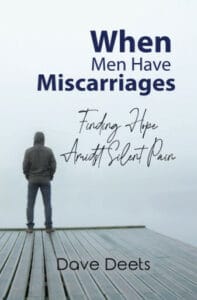Excerpt:
Man 1: When my wife and I found out we miscarried, there was this immediate emptiness and, you know, it felt like something we had planned so long for was just gone.
Man 2: You know, it actually doesn’t help seeing your friends with their pregnancy announcements when you’re walking through a miscarriage because they’re all so happy and all you want to do is yell and get angry.
Man 3: You know, I. I don’t know what I feel in this moment, and uh, I don’t know if I’ll ever be able to talk about our miscarriage.
End of Excerpt
John Fuller: Hmm. Well, those statements reflect the pain and emotional confusion that many men can experience when their wives go through a miscarriage. And today on Focus on the Family, we’ll look at this topic more deeply and discover how God wants to bring healing to couples who have experienced a miscarriage. Your host is Focus President and author, Jim Daly. And I’m John Fuller.
Jim Daly: John, right at the beginning here, I want to make sure the listeners, the viewers, know that if you have lost a child, we understand and we are here for you. We grieve with you. Losing a child under any circumstance can be devastating and can be a very rough road back to recovery. But the Lord cares about you. He sees you and we at Focus on the Family are here for you. We just wanted to make sure right at the beginning of the program here we mention that because this will be, you know, a deep, thoughtful program about the loss of children.
Jim: And we do have caring Christian counselors here at Focus. So if you get a hold of us, they are willing to talk with you and help you with other resources, and certainly Dave’s book that we’re going to talk about today.
John: Mm-hmm. Yeah, we have a really powerful conversation specifically for men who have undergone this experience. Almost all of the books and videos and podcasts you can find about miscarriage are directed to women, that makes sense, of course.
Jim: Mmm.
John: But husbands and would be dads also grieve over the loss of that precious child. And we’re not so good about expressing that grief and such.
Jim: In fact, John, people guys do write in and say when we cover the program from the moms angle, why don’t you ever talk about it from the fathers angle?
John: Yep.
Jim: Well, this program is going to be for you. Women certainly can lean in and hear this conversation, but it will be geared toward the dads.
John: Mm-hmm.
Jim: And, you know, our guest today, Dave Deets, has gone through, he and his wife, miscarriage on multiple occasions. He and his wife, Kimberly, they have three teen children and four children in heaven. Dave also spent 20 years as a pastor trying to help others work through grief like this. And, Dave, it’s great to have you. Welcome to Focus.
Dave Deets: Well, thank you so much. Glad to be here.
John: Yeah. Let me mention Dave is an author and a speaker and serves as Vice President of the Institute of Biblical Leadership which provides coaching and consulting, counseling and training to ministry leaders.
He’s written a book that forms the basis for our conversation. It’s called, When Men Have Miscarriages, Finding Hope Amidst Silent Pain. And we’ll encourage you to get in touch for that book or to talk to one of our counselors. We’ve got details at focusonthefamily.com/broadcast.
Jim: Dave, let’s start with this question. So typically pregnancy and childbirth is rightfully, understandably so much about wife and mom, right? Because they’re, they’re carrying the load, literally. And they’re, you know, going through the experience.
Men can often feel like we’re on the peripheral. You know, we’re just on the edge of this experience. But in that regard, um, how do men kind of get into the whole experience, even with loss that we’re going to talk about? But I felt that way. I mean, you know, when I was in the well-baby checkups with Jean, you know, I was just on the side of the wall basically listening in.
Dave: Right. Yeah. I think for men, um, it takes us being able to be proactive to enter into that. I think sometimes obviously, the wife, you know, they want- certain wives want you to, you know, kind of being more engaged.
And men are I think we’re confused. We’re not sure. There’s a lot we don’t understand. And so I think it just naturally we pull back because like, whoa, we don’t know what’s going on. Some men obviously would engage.
But I think it takes being proactive and to, part of like what I’m sure we’ll talk about or what we talk about in the book, is this idea of owning it, if you will. Of owning that pregnancy. Um, to be able to say that’s as much mine as it is hers. But I think we’ve done such a horrible job at kind of segregating out-
Jim: Hmm.
Dave: … this concept of pregnancy. “That’s the woman’s deal and I’m just over here as a dad and kind of doing my thing.” And as opposed to saying, “Yes, she’s carrying the baby. It’s forming inside of her. But this is ours. We’re in this together.”
Jim: You know, from a Christian standpoint, that’s the way it should be and-
Dave: Yeah, it should be that.
Jim: … that obviously this is our baby.
Dave: Right.
Jim: And but, you know, you’re going to have to carry the burden-
Dave: Right.
Jim: … of the pregnancy, obviously. But we’re here for ya. I’m here for ya.
Dave: But even, I think even in Christian circles, the I mean, I heard a pastor just recently, he was he was talking about his own experience of being pregnant, wasn’t anything to do with miscarriage. And he said, he was probably in his sixties, and he said, “When we were when we were having children,” he said, “I used to talk about ‘My wife is pregnant.’” He goes, “These kids nowadays talk about, ‘We’re pregnant.’ He goes, “That’s just crazy.” And I’m like, “Well, actually it’s not.”
Jim: Yeah, I like that, actually, because it puts the two of you right there…
Dave: It does put, yeah…
Jim: … together. Um, you and your wife, Kimberly. You’re pretty young when you got married, I’m sure you had your many anticipations and what would be wonderful, and having children at some point. Just describe kind of what you were facing. And then speak to the statistics around miscarriage.
Dave: Yeah. So the statistics are, you know, about half of the pregnancies will end in some form of miscarriage.
Jim: About half?
Dave: Yeah.
Jim: That was kind of shocking to me. I thought that was really high.
Dave: Yeah. Especially, you know, in those early days…
Jim: Yeah.
Dave: … those early months, um, you know, the four that we had, the two middle ones, I mean, I didn’t even know that I was aware that she was pregnant or could possibly be.
Jim: Yeah.
Dave: You know, they happened fairly quickly. Um, but I think for, you know, for the husband and the father who’s processing through that, um, just trying to wrap their head around, it’s hard to wrap your head around pregnancy and then to wrap your head around losing the baby.
Jim: But the losses had wh- just describe those and the, the…
Dave: And so, yeah.
Jim: … the chronological order.
Dave: Yeah. The first one, she was 12 weeks along and, you know, called me that day when I was at work. And, and she had a routine doctor’s appointment and I wasn’t, again, I wasn’t paying attention. Like, I’m doing my thing. She’s doing her thing. I got to go see the doctor. Okay, great. Whatever. I don’t even know what that means. I don’t even know what’s involved.
And so then you get this phone calls at work, and get this phone call, and she’s hysterical. Crying. And she’s trying to get out the words of, “They said the baby is dead and they want to just- they want to take me next door and take care of it.”
And you… I mean utter shock of like-
John: Mmm.
Dave: … I’m not even tracking the pregnancy, really. I mean, I am, but not like what she is, um. And then I remember coming in, she was sitting on the table and the nurse came in and she tried to just explain, you know, what, we’ve- we’ve done the ultrasound and there’s no movement. The baby’s dead and we just need to go next door and we’ll just we’ll just take it. And just, you know, utter shock.
Jim: Very medical.
Dave: Very medical. Very, you know. Yeah, just very procedural.
Jim: Yeah.
Dave: And, and fortunately, I had talked to my mom on the way there, who’s a nurse, and my mom’s very calm, very rational, and, you know. And she had sure- assured me, you know, if the baby’s dead, the body will naturally, you know, do things to get rid of it or to remove it. And so she- her thought with that was don’t panic, you know, don’t, don’t overreact.
And um, and so we didn’t. We just told the nurse, well, we’ll prefer to go home. And so she let us. And and then over the next two weeks nothing happened. Nothing changed. So it’s weird. So then you’re like, you get this hysterical phone call and your world is rocked from the standpoint of, “Oh, my word. My baby’s dead.” But we’ve decided not to have a procedure done. And then the next two weeks, it’s like nothing has happened and it’s just everything’s normal. So then your brain is playing games on you. Like, okay, was this a dream? Was this real? Was this? And then, you know, for us, when the two weeks was up and she started miss- the process of the miscarriage and then taking her to the hospital, you know, that was that was really the horrific for us, for me, the horrific moments that Friday night in the women’s hospital.
Jim: You know, in the book you mentioned that that it kind of cemented your emotions. Which I- I get it. I think for guys, this is one of the things. We talk to a lot of marriage experts, how men compartmentalize our emotions.
Dave: Yeah.
Jim: It’s why we’re probably effective in war. We can, you know, the World War II group that went, they just lock those thoughts and comments away. You would talk to people who said, “You know, I just never talked- my dad never talked about that.”
Dave: Right.
Jim: And it is both, I think, both a positive and a negative to where men can lock down those emotions and move on with life and and maybe not be held back by those things.
Dave. Right.
Jim: But you used that word that in that first miscarriage you had, it kind of cemented your emotions.
Dave: Yeah.
Jim: Are you saying something similar?
Dave: Yeah, I think for me it was like, you know, especially when the nurse came in and, and I love nurses. My wife is now studying to be a nurse. And she, you know, “Oh, yeah, she’s just having a miscarriage.” You know, here my wife is, you know, very, for me, very traumatic experience of her hemorrhaging our baby and all of this stuff on to the bed. And the nurse very matter of factly was, “Oh, yeah, she’s just having a miscarriage. We’ll, we’ll kind of take care of her.”
And for me, it was in that moment that it was like, okay, so I’m in this war situation or I’m in this traumatic situation. You’re not supposed to have emotions. I get that.
Jim: Be a-
Dave: Be a man. Suck it up.
Jim: … the wall.
Dave: Yeah.
Jim: You know, sturdy.
Dave: Nobody wants to hear you complaining. It’s just normal natural miscarriage. And so I think in that moment for me, it was like, well, then nobody’s going to hear me complain. And this didn’t bother me. This didn’t affect me. We’ll just go into a mode of dealing with whatever’s next very stoically and move forward.
Jim: How did that affect Kimberly? I mean, with that stoic approach coming from her husband?
Dave: Yeah, I think in years later, actually through the process of starting to write the book, I think that’s why we were able to have a good conversations for me to be able to say, you know what, I realize I did not handle that well. I should have been this or I should have been that.
I think for her then later on, being able to express, you know, that would have been helpful.
Jim: Right.
Dave: But I think actually what it did for her, at least my take on this would be what it did for her was almost simultaneously, “Oh, well, Dave is locked down, so I guess I have to lock down…”
Jim: Mm-hmm.
Dave: “… even though I don’t want to or don’t know how to as much. But he’s not going to talk about it, so I guess I’m not going to bring it up.”
Jim: Oh, wow.
Dave” Because, you know, I communicated this notion to her, “This didn’t even happen.”
Jim: Yeah, let’s not speak about it.
Dave: Let’s not speak about it. We’re not gonna talk about it. And so for her, she’s gone through it going, “It actually happened. And my body has gone through a lot of things. But apparently this is not allowed to talk about.”
Jim: We’re going to continue through that story. But I wanna to uh, bring in your vocational training. You’re a pastor. You met with couples that had gone through this. You saw the various responses of couples that had gone through miscarriage. How did the husbands react differently than maybe you had reacted or, you know, what were what were your observations with others that you were actually counseling?
Dave: I remember one of the first couples I counseled, they talked about going out and getting a cemetery plot and having a burial for, you know, their miscarried baby. And at the time I thought, “Wow, that seems elaborate. That seems like a lot.” But you know what? If that helps you, I think as a pastor, my posture was, if that is what is helpful to you, then that’s great.
Jim: I want kind of a coping mechanism.
Dave: Yeah. Yeah. Um, I think in counseling I would have said, you know, whatever, whatever you need to do to help you grieve…
I remember talking to one other man. He was actually a pastor. They went through it multiple times. And he told me, he said, “We’re actually going through the formal steps of grieving, like the whole grieving process.” And I think that was something for me that was like…
Jim: Yeah.
Dave: And that was kind of at the beginning, maybe a year or two before um, we started working on the book, um, was just for me going, “Dave, I wonder if you missed something here? I wonder if you, you know, in your strong, bullheaded stubbornness to just lock down,” which I can do it very well, “you missed something.”
Jim: Yeah.
Dave: And I think those were some of the things that even in counseling, God used to start pricking my heart to be open to thinking about, okay, what do I need to do?
John: Hmm. Well, Dave Deets is our guest today on Focus on the Family. And he mentioned a book. It’s called, When Men Have Miscarriages Finding Hope Amidst Silent Pain. And it’s a terrific little resource to kind of get the conversation going, husbands, dads. And we would recommend you get a copy of that from us here. We’ve got details at focusonthefFamily.com/broadcast.
Jim: Dave, in the book, you share some advice for both husbands and wives about how to navigate that pain and grief, which is good, something you didn’t do. And that’s what you’re saying.
You stress the importance of unconditional love, which, you know, regardless of the circumstance that a couple might be going through that sounds like good medicine.
John: Right.
Jim: Unconditional love, always. But you said, especially coming from the husband in this situation toward his wife. What does that kind of unconditional love look like when you as a couple are going through a miscarriage?
Dave: You may not understand everything your wife is going through. You may not understand every emotion she’s giving you. Uh, you may not understand why she’s crying, you know, three months down the road. But unconditional love to me would say, “I’m going to care for her, be sensitive to her, love her, hold her, help her, assure her.” I- I’m never… In other words, I would say it this way. I’m never going to get to a point where I say, “You know what? It’s time to be done with this and we just need to move on.”
Jim: Yeah.
Dave: As a man, I had done that. As dads, as husbands. I think we do that often. And unconditional love says, I’m going to set aside my own thoughts and feelings about this, that I may not think you should be doing this, but I’m not going to tell you that. I need to actually love you in the midst of your pain that you may still be having.
Jim: Right.
Dave: And that could even be years later. You know, you never know what things could trigger or what emotions could be triggered later. And so, you know, even if we you know, even if we got home next week and Kimberly is just recounting, you know, the events of the book and the events of, you know, even doing this broadcast or whatever. Unconditional love says, you know, I’m not going to tell her, “Hon, it’s been like 12 years. What’s your problem?” Unconditional love says, you know, “I will wrap my arms around you, tell you I love you and do whatever I need to, to help walk you through this.”
Jim: But the good thing to remember is you learned this now.
Dave: I learned that. Yes.
Jim: Back then you would have done that.
Dave: Back then I didn’t do that.
Jim: Well, you would have said, “Yeah, let’s get moving.”
Dave: Yeah.
Jim: And I identify with that.
Dave: Absolutely.
Jim: Believe me, I’m not critiquing you, identifying with you-
Dave: Yes.
Jim: … because that’s exactly what I did.
Dave: Yeah. So during the miscarriage processes of our miscarriages, I would have been that way of like, I can give you a day or two or a week.
Jim: Yeah, come on, let’s…come on.
Dave: But like I, we’re still dealing with this? Like, it’s so because men, especially for me, like me, had compartment and shut this thing down.
Jim: Yeah.
Dave: Now I’m not like, “Why are we still dealing with this?”
Jim: I mean, hearing us talk about it even sounds so insensitive.
Dave: It is.
Jim: I mean, because it is.
Dave: It is.
Jim: But we don’t know at the time.
Dave: In the moment, I would have said, “You know what? You need somebody to be that rock.”
Jim: Yeah. You mentioned the fourth trimester. To beware of that. What did you mean by that?
Dave: So that’s those triggering moments, you know, I think I used a couple of examples in the book of, you know, your wife’s in the grocery store and here she passes another lady with a shopping cart. And uh, you know, she asks how old the baby is. And it triggers this thought of like, “Oh, our baby would have been that…” you know.
And so for women, I think what I never realized is how much women track all of those details. You know, where guys are like, Oh, we’re pregnant and cool. We’re going to be happy with that.
I think women are tracking all those details. So, hey, this baby is three months old. Our baby would have been three months old.
Jim: Oh. Yeah.
Dave: And those triggering moments… Or, you know, it’s- this is their one year anniversary. Or, you know, our- this… Kimberly we’ll do this occasionally now. You know, our oldest would have been going to college.
John: Mmm.
Dave: And I’m like, I hadn’t even thought about that. I didn’t plan that thing out 18 years.
Jim: Right.
Dave: But for her, it is so prevalent on the forefront of her mind.
Jim: All the milestones.
Dave: Yes, all those milestones. So even, you know, I think even a couple of years ago, she mentioned, you know, our oldest would be going to college. And I’m like, I hadn’t thought about that.
Jim: Yeah.
Dave: Like, you know, I’m thinking about our, our children that we currently have-
Jim: Yeah.
Dave: …and I’m thinking about them because that’s right here in front of me.
Jim: Sure.
Dave: But that? I’m not processing and thinking through. So. So those fourth trimester, you know, it’s just kind of a weird concept, but the fourth trimester are those triggering moments beyond even that first couple of months. Could be years beyond that, um, that just triggered those emotions for the woman.
Jim: Uh, Dave, let me ask you, you have, as we unfold more of your story, you and Kimberly, there’s another miscarriage that you go through. But your son, Caleb, was born. He’s two and a half, I think, at this point. And he was in the office, the doctor’s office, when you got the news that that current pregnancy was struggling> What was the environment? What did you hear? What did the doctors say? How did Caleb respond?
Dave: Right. So we had Caleb with us. We didn’t have a babysitter. And, you know, we just didn’t think it was a big deal. He was two and a half. He loved baseball. Caleb, you know, was always and he still is, he’s a big Cubs fan, like his dad. And so he was just off in the corner playing with- had some toys. And so Kimberly is getting the ultrasound. The technician was really, I don’t think he was in a good mood that day. You know, very abrupt, very quick. You know, this was like a second opinion consultation that we’d gone to. And so he, you know, opened up the machine. He’s kind of doing the ultrasound. He’s like, “They told you you had twins?” You know, very skeptical. I’m like, “Well, yes.” I mean, I know that we have. We’ve heard the heartbeats. We’ve heard, you know. So, yeah, we’re not just here because we’ve made this up. And, um. And, and so he said, “Well, I don’t know why they told you that. You only have one baby,” slammed his computer shut and walked out the door. I mean, it was the most abrupt, just like, bizarre.
Jim: Wow.
Dave: And so there we are. He’s gone. And we’re I mean, I could certainly, you know, Kimberly is laying there. I’m standing next to her and I’m like, “Holy cow. That was- that was that was very abrupt.”
Jim: Yeah, what just happened.
Dave: What just happened? And we’re not even, I was not even thinking about Caleb. He’s over in the corner playing. And all of a sudden out of the corner, he just- I mean, he stopped playing and he stood up and he just said, “No catcher?” For him in his mind, he was so thrilled about the fact that we were having twins because in his head he had it all planned out here. Somebody was going to be the pitcher, somebody was going to be the catcher, and he was going to be the batter. And for him, the world came crashing down because he lost the catcher.
Jim: Lost the catcher. Now, Andrew was the baby that did survive that pregnancy.
Dave: Yes.
Jim: Andrew, I think, you know, kept pushing you on some things. I don’t know what age he began to kind of be a sore in your side-
Dave: Yes.
Jim: … about the fact that his sibling miscarried.
Dave: Yep.
Jim: Describe that, and that discussion with Andrew. Or the discussions with Andrew, and how did that evolve into something he did?
Dave: Yeah. So that was, Andrew did not get the memo that we don’t talk about this. So um, yeah. He’s about two and a half, three years old. He and Caleb shared a room. I remember on a Sunday morning. And I was getting ready, we were getting ready for church, and all of a sudden- Andrew’s very loud and he’s very boisterous, he’s very energetic. And all of a sudden from their room I hear “What?!” He said, “What? I was a twin?” And I remember thinking in the moment in the hallway, like, I guess we should have had a conversation-
Jim: Wow. Yeah.
Dave: … that we didn’t have.
Jim: Yeah, but he was how old?
Dave: He was three.
Jim: I mean, that’s.
Dave: Yeah.
Jim: So you would think you could wait a little while.
Dave: You could wait a little while. Yeah. But Caleb had informed him-
John: Mm-hmm.
Dave: … that Sunday morning they decided to have a conversation.
Jim: And Caleb was, what, five?
Dave: Caleb was five. So Caleb had been informing him, “And, oh, by the way, you are twin. And I didn’t get my catcher.” And so Andrew is now in shock of like-
John: Hmm.
Dave: “Wait a minute, Who told? You know, nobody told me that I have a twin.” And it wasn’t right away. I mean, he would kind of start processing and talking a little bit. But maybe when he was about four to five years old, he really started talking about this more and more often. And, and that was really the angst with me because I’m like, I don’t want to talk about it. Like, you know, Andrew- with I didn’t tell him this. But the first one I kind of like this didn’t happen and now the rest of them are going to happen. And so we don’t talk about this.
Andrew is very expressive. He’s very you know, he’s got a lot of words to say. And so he wanted to talk about it. And so about four or five years old, he began to have conversations around my twin. My twin. You talk about my twin. Anybody who knows Andrew knows he’s had a twin.
And so at one point he said, “You know what? She was a girl.” Like, “How do you know she was a girl?” “Well, dad, I think she was a girl.” He came back and he said, “I think her name was Abby.” I’m like, “You’ve got to be kidding me. You’ve given her a gender. You’ve now given her a name.” Like this is not going in the right direction. This is how I’m feeling is what I’m thinking. Andrew was extremely persistent that we are going to talk about this. This is my sister. And in fact, he at one point he told me he said “Dad,” he said, “my purpose in life is to live life on her behalf.”
Jim: Oh, my goodness.
Dave: To be able to experience life for my sister.
We moved to Grand Rapids and we had a sweet, sweet family in our church who ran a ministry that was next to the abortion clinic in downtown Grand Rapids. And they had the memorial that they would for ladies who had had an abortion. It was a grieving process post-abortive where they would name their baby and they would just put the first name on this stone. It’s a big kind of memorial stone in downtown Grand Rapids. And Kimberly would take Andrew. They would volunteer at this ministry. It’s just our church would do a lot for them. It’s just a great ministry.
And um, I remember Kimberly told me one day she said, “Andrew wants to talk to Julie about memorializing Abby.” I’m like… You know, in my mind I’m like, no, like, stop, stop, Please stop. And yet part of me is like, I’ve got to let him grieve. So I’m- I’m like super conflicted.
So she walked him through that. Julie is an amazing woman. She walked him through it. And so they went down the first night. Kimberly took Andrew. And they looked when it was- when it was done being etched in the rock. And I told her, I said, “I’m not- I’m not going.” And so I didn’t go. And so Kimberly took Andrew and they went down, and he was thrilled. Like to him this was the most exciting day. Almost as, as exciting as Christmas- was like my sister has her name-
John: Mmm.
Dave: … in this memorial. For him, it was like he had, he had accomplished one of his objectives.
Jim: How old is he now?
Dave: He probably at that point is 10.
Jim: And so he’s today.
Dave: He’s 16 today.
Jim: Wow. I want to meet this kid.
Dave: Yeah, he- oh, yeah. You would. He’d be memorable.
Jim: (laughs)
Dave: Um. So. So Kimberly told me, you know, she was gracious, super gracious to me because she let me deal with- she kind of mediated she let me be distant. But I was allowing Andrew to do that, so everything was good.
As she told me one day, she said, “Dave, you, you really need to go. You really need to go down there.” And I refuse. And refuse. And refuse. Finally, one day, it was a gloomy day in December, and most days in December are gloomy in Grand Rapids. And I told her, I said, “I’m going to be late.” You know, I was the lead pastor at that point. I said, “I’m going to be late coming home. I got to do some stuff.”
And so I remember driving down to the to the cemetery where the Garden of Hope is and the memorial. And I remember just standing there and um, staring at the name Abby Deets. The only name on that memorial that has the last name. And for me, I think as angry as I was that Deets was there because I’m like, now everybody knows.
John: Mmm.
Dave: Everybody is going to know when they see that that I had this problem. It was almost like he was outing me to the world.
Jim: Wow.
Dave: And so to be able to stand there and then come to terms with it while I stood there, I stood there for a long time staring at that name. And being able to come to terms. And then just to be broken over the fact that, “You know what, Dave? You cannot be so selfish as to disallow your son to process and grieve the way he needs to process and grieve.”
Jim: Yeah.
Dave: So I went home and I grabbed him, hugged him, held him. And he and- this journey has, it’s affected everybody. I mean, you know, Kimberly and Caleb and Rebecca, our daughter. But it’s been this journey of Andrew and I, I would say together, of him really shepherding his father.
Jim: Yeah, that’s the story. That’s what’s so breathtaking about it. Makes him such an interesting person-
Dave: He is.
Jim: … to- to meet at some point. I’d love to do that.
Dave, you have really shared your heart, and I so appreciate it. I think this falls right into that category, like I said at the beginning, when we talk about this from Mom’s perspective, so many dads contact us to say, “What about the dads?” Well, now we have it, When Men Have Miscarriages: Finding Hope Amidst Silent Pain. You described it so well. And your humility to even tell the world that, you know, your young son is the one, along with Kimberly’s persistent love-
Dave: Right.
Jim: … kind of pulling you out of this compartmentalization, which I would guess would be the advice you’d have for other men going through this. Don’t live silently on this.
Dave: Right. Yeah. Yeah. So I think this journey has been, has been interesting for me. I wish in hindsight I could go back to, you know, when we first had that first miscarriage, say, I wish I knew then what I know now.
Jim: Well, that’s the point.
Dave: And so this was written to say, maybe, “We’ve had our bumps and bruises along the way. Maybe we can help others.”
Jim: Yeah. If you’re in that spot or, you know, somebody who is get a hold of us and we’ll get this book into your hands. It’s not a big book. It gets to the point quickly. And uh, I think it’s just what you’ll need as a man going through a miscarriage with your wife.
And if you can make a gift of any amount, will send it as our way of saying thank you. If you can’t afford it, get a hold of us. We’ll get it into your hands and trust others will take care of the cost.
John: Yeah. Reach out to us.
And earlier, Jim mentioned our counseling team. Please let us connect you with one of those counselors if this is something you need to talk through.
Our number is 800, the letter A, and the word FAMILY. 800-232-6459.
And then at our website you can donate and get a copy of Dave’s book, When Men Have Miscarriages Finding Hope Amidst Silent Pain. That’s focusonthefamily.com/broadcast.
Jim: Dave, thanks again for being with us and thanks for sharing your heart and being so vulnerable. I love it.
Dave: Yeah. Thank you, Jim. And thank you, John. Appreciate it. It’s been a great opportunity.
John: Well, have a great weekend with your family and your church family as well. And coming up Monday, Ray Vander Laan joins us to explain how understanding the original context of scripture can add a new and rich meaning to God’s word. Join us then.
And for now, on behalf of Jim Daily and the entire team, I’m John Fuller, inviting you back as we once more help you and your family thrive in Christ.



















